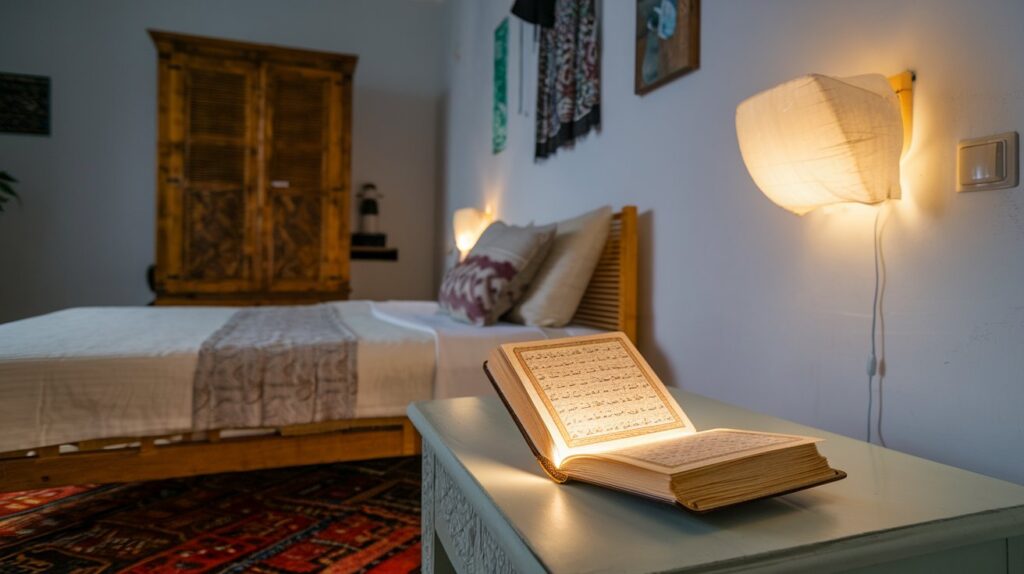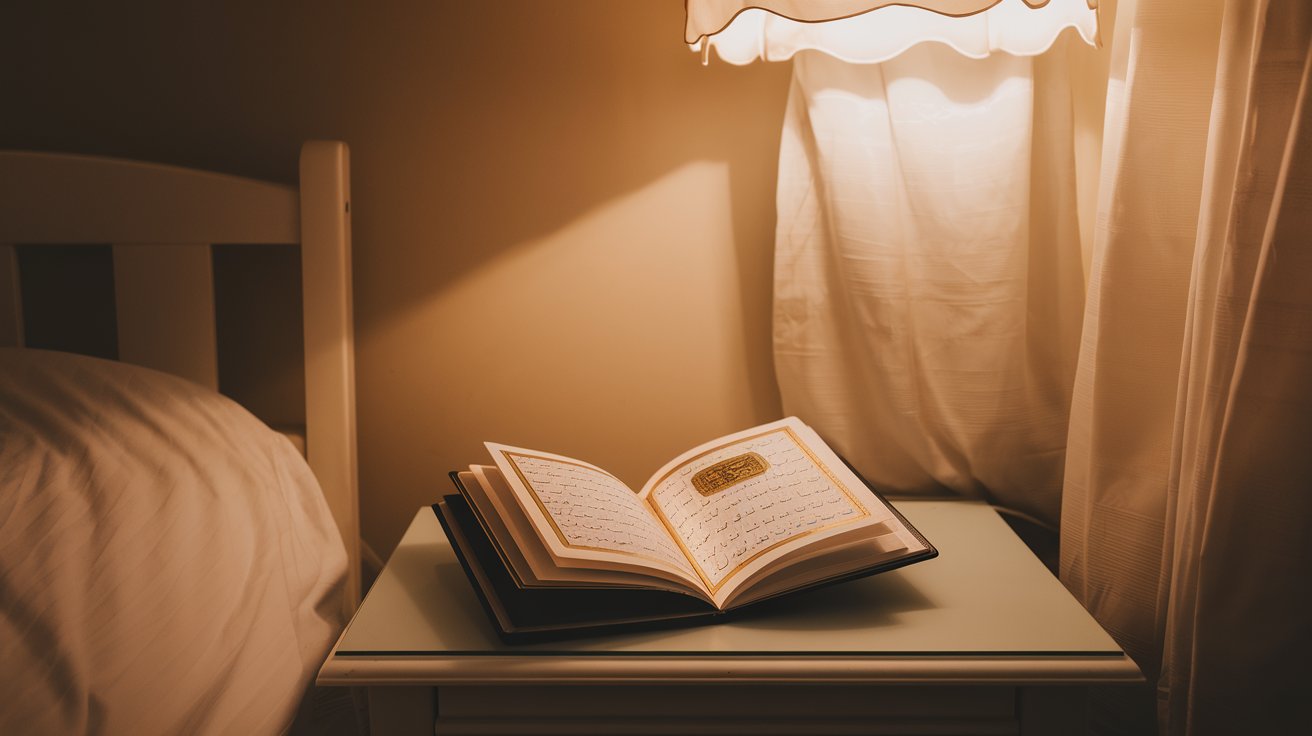Sleep is a blessing from Allah, providing rest, rejuvenation, and peace of mind. However, many people struggle with falling asleep due to stress, anxiety, or restlessness. In Islam, reciting dua for sleep from the Quran can bring tranquility and protection from negative thoughts. These supplications invoke Allah’s mercy, ensuring a peaceful and restful night. In this article, we will explore five powerful duas from the Quran for better sleep, their significance, and how they help in achieving a deep and undisturbed rest.
5 Best Duas for Sleep from the Quran
1. Surah Al-Baqarah (2:286) – Dua for Peaceful Sleep
Arabic:
رَبَّنَا لَا تُؤَاخِذْنَا إِن نَّسِينَا أَوْ أَخْطَأْنَا ۚTranslation:
“Our Lord, do not impose blame upon us if we forget or make a mistake.”
Significance:
This dua seeks Allah’s forgiveness and relieves stress, allowing the mind to be at peace before sleeping.
2. Surah Al-Isra (17:79) – Dua for a Restful Night
Arabic:
وَمِنَ ٱلَّيْلِ فَتَهَجَّدْ بِهِۦ نَافِلَةًۭ لَّكَ ۖ عَسَىٰٓ أَن يَبْعَثَكَ رَبُّكَ مَقَامًۭا مَّحْمُودًۭاTranslation:
“And in some parts of the night, offer the prayer with it as an additional worship for you; it is expected that your Lord will resurrect you to a praised station.”
Significance:
Reciting this verse before sleep can bring inner peace and a sense of divine connection, leading to a restful night.
3. Surah Al-Kahf (18:10) – Dua for Comfort and Relaxation
Arabic:
رَبَّنَآ ءَاتِنَا مِن لَّدُنكَ رَحْمَةًۭ وَهَيِّئْ لَنَا مِنْ أَمْرِنَا رَشَدًۭاTranslation:
“Our Lord, grant us from Yourself mercy and prepare for us from our affair right guidance.”
Significance:
This verse provides a sense of security and trust in Allah, calming the heart and promoting relaxation.
4. Surah Az-Zumar (39:42) – Dua for Safe and Deep Sleep
Arabic:
ٱللَّهُ يَتَوَفَّى ٱلۡأَنفُسَ حِينَ مَوۡتِهَا وَٱلَّتِي لَمۡ تَمُتۡ فِي مَنَامِهَاۖ فَيُمْسِكُ ٱلَّتِي قَضَىٰ عَلَيْهَا ٱلْمَوْتَ وَيُرْسِلُ ٱلْأُخْرَىٰٓ إِلَىٰٓ أَجَلٍۢ مُّسَمًّۭىۚTranslation:
“Allah takes the souls at the time of their death, and those that do not die (He takes) during their sleep. Then He keeps those for whom He has decreed death and releases the others for a specified term.”
Significance:
This verse reminds us of Allah’s control over life and sleep, providing reassurance and eliminating fear of the unknown.
5. Surah Al-Furqan (25:47) – Dua for a Tranquil Sleep
Arabic:
وَهُوَ ٱلَّذِى جَعَلَ لَكُمُ ٱلَّيْلَ لِبَاسًۭا وَٱلنَّوْمَ سُبَاتًۭا وَجَعَلَ ٱلنَّهَارَ نُشُورًۭاTranslation:
“And it is He who has made the night for you as clothing and sleep (a means for) rest and has made the day a resurrection.”
Significance:
This verse highlights sleep as a divine gift, bringing calmness and renewal for the next day.

Benefits of Reciting These Duas Before Sleeping
- Promotes Relaxation – Helps calm the mind and body, preparing for restful sleep.
- Provides Protection – Shields from nightmares and evil influences during sleep.
- Strengthens Faith – Increases trust in Allah and reliance on His mercy.
- Relieves Anxiety – Reduces stress and negative thoughts, leading to peaceful rest.
- Aligns with Sunnah – Following the practice of Prophet Muhammad (PBUH) brings additional rewards.
Best Times to Recite These Duas for Maximum Effect
- Before Lying Down – Recite these supplications as part of your nightly routine.
- After Wudu – Performing ablution before sleep enhances the spiritual effect of the duas.
- While in Bed – Whisper or mentally repeat these verses while closing your eyes.
- If Waking Up at Night – Reciting again can help in falling back asleep peacefully.
Islamic Teachings on Sleep and Seeking Allah’s Mercy
- Sleep is a Form of Worship – When done with the right intention, sleep can be an act of devotion.
- Dua Brings Inner Peace – Calling upon Allah’s name before sleeping purifies the soul.
- Expressing Gratitude for Sleep – Acknowledging sleep as a divine blessing increases barakah.
- Following the Sunnah Enhances Sleep Quality – Sleeping in the recommended position (on the right side) aligns with Islamic teachings.
Conclusion
Reciting dua for sleep from the Quran ensures a peaceful, protected, and spiritually fulfilling rest. These supplications help relax the mind, remove stress, and strengthen faith in Allah’s mercy. By incorporating these verses into your bedtime routine, you can achieve a restful sleep and wake up refreshed, ready to embrace a new day with renewed energy and faith.










